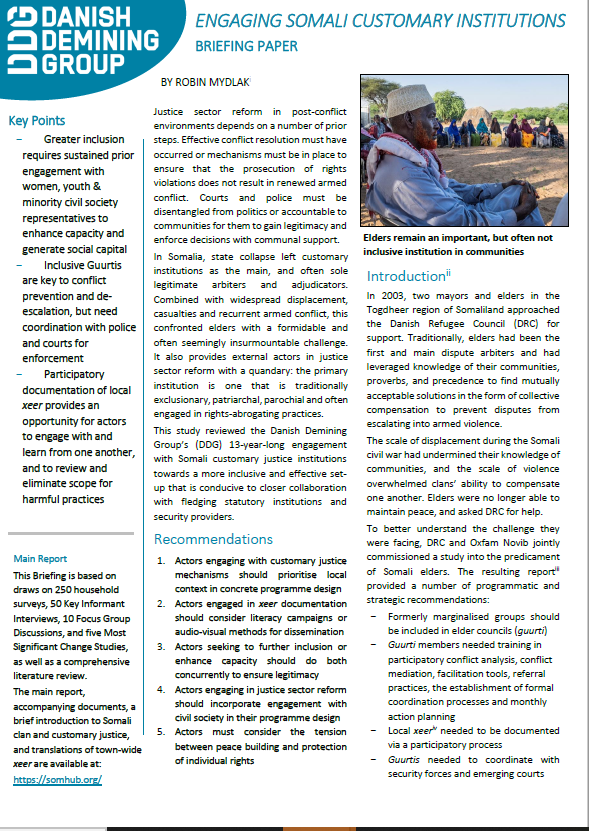Justice sector reform in post-conflict environments depends on a number of steps. Effective conflict resolution must occur, or mechanisms must be in place, to ensure that the prosecution of violations does not result in renewed armed conflict. Courts and police must be disentangled from politics and accountable to communities for them to gain legitimacy and enforce decisions with communal support. In Somalia, state collapse left customary institutions as the main, and often sole legitimate authority on justice. Combined with widespread displacement, casualties, and recurrent armed conflict elders were confronted with a formidable and often seemingly insurmountable challenge. It also provides external actors in justice sector reform with a quandary: the primary institution is one that is traditionally exclusionary, patriarchal, parochial, and often engaged in rights-abrogating practices
This briefing summarises a study reviewing Danish Demining Group (DDG)’s 13-year-long engagement with Somali customary justice institutions towards a more inclusive and effective set-up that is conducive to closer collaboration with fledgling statutory institutions and security providers. The study drew on 250 household surveys, 50 key informant interviews, 10 focus group discussions, and five most significant change (MSC) studies, as well as a comprehensive literature review.
Key findings include:
- Greater inclusion requires sustained prior engagement with women, youth & minority civil society representatives to enhance capacity and generate social capital
- Inclusive Guurtis are key to conflict prevention and de-escalation, but need coordination with police and courts for enforcement
- Participatory documentation of local xeer provides an opportunity for actors to engage with and learn from one another, and to review and eliminate scope for harmful practices
Those seeking to engage in security and justice reform efforts should:
- Prioritise local context in concrete programme design when engaging with customary justice
- Consider literacy campaigns or audio-visual methods for the dissemination of materials related to xeer
- Concurrently seek to enhance capacity and broaden inclusion efforts to ensure legitimacy
- Include civil society in programme design
- Consider the tension between peace building and protection of individual rights
The main report, accompanying documents, a brief introduction to Somali clan and customary justice, and translations of town-wide xeer are available at: https://somhub.org

